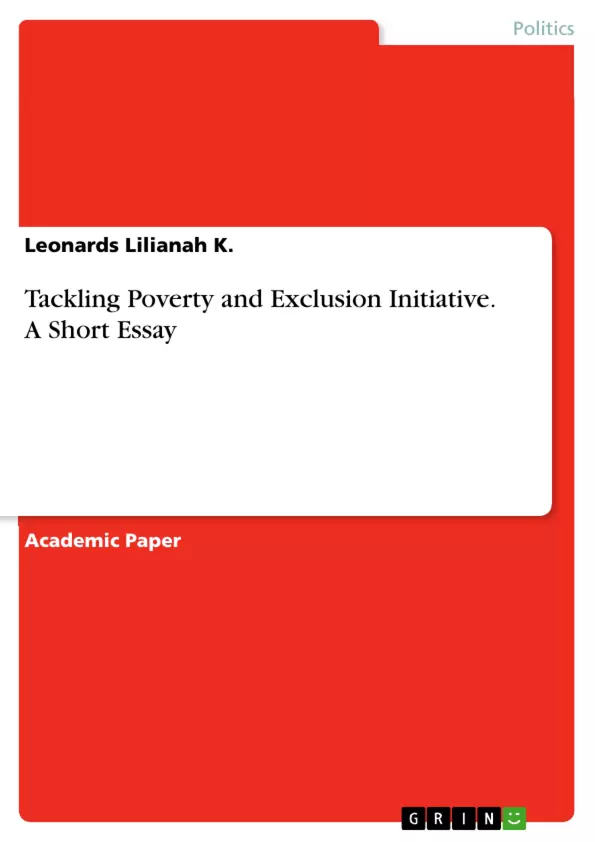Although community development begins with identifying unmet needs, tackling poverty encapsulates a complex web of multidimensional social and economic challenges. These webs often have intersecting triggers and drivers of deprivation. Social exclusion corresponds with health disparities, socioeconomic destitution, and other forms of social injustices. Given that the degree of marginalisation is directly proportional to poverty, vulnerable groups are prone to severer effects of the ongoing 2019 coronavirus (COVID-19) pandemic. The unprecedented nature of COVID-19 lockdowns may further complicate community development agendas, thus escalating poverty rates across global societies. Socioeconomic disruptions, health devastation, and uncertainties underscore the need for multi-stakeholder engagement to strengthen the resilience of vulnerable groups through the COVID-19 crisis.
Table of Contents
- Tackling Poverty and Exclusion
- The Trussell Trust and Food Banks
- Social Exclusion and Hunger
- The Impact of Hunger and Poverty
- The Role of Food Banks in Addressing Poverty
- Professional Qualities in Food Bank Systems
- The Trussell Trust's Approach to Poverty
- The Challenges of Quantifying Poverty
Objectives and Key Themes
This text explores the complex issue of poverty and exclusion in the UK, focusing on the role of food banks in addressing these challenges. It examines the origins and evolution of the 'tackling poverty and exclusion' policy framework, the work of the Trussell Trust, and the impact of hunger on individuals and communities.
- The concept of social exclusion and its connection to poverty and hunger.
- The Trussell Trust's approach to combating poverty and hunger through food banks.
- The impact of poverty and hunger on individual well-being, health, and social inclusion.
- The professional skills and qualities needed to work effectively in food bank systems.
- The challenges and limitations of using quantitative indicators to measure and address poverty.
Chapter Summaries
- The text begins by introducing the concept of 'tackling poverty and exclusion' as a policy framework that emerged in France and later spread to other nations. It discusses how this model addresses social exclusion by linking human welfare to environmental and societal conditions.
- The second section focuses on the Trussell Trust, a British charity organization that operates a network of food banks across the country. It highlights the charity's mission to reduce reliance on food banks by promoting socioeconomic prosperity and addressing hunger as a key indicator of poverty and exclusion.
- This chapter delves into the concept of hunger as a function of household food insecurity with social and economic dimensions. It examines how hunger reflects the degree of social exclusion from welfare programs and provides insights into the factors contributing to food insecurity.
- The text explores the detrimental consequences of poverty, marginalization, low income, and malnutrition on individual and societal well-being. It highlights the impact of insufficient access to nutritionally adequate food on physical and mental health, social inclusion, and life prospects.
- This section discusses the benefits of charity food systems, including their role in addressing health disparities, reducing financial pressure, and empowering vulnerable communities. It emphasizes the importance of social support networks and referral systems in providing comprehensive assistance to beneficiaries.
- The chapter focuses on the essential professional qualities needed to work effectively within food bank systems. These qualities include empathy, effective communication, cultural competence, and intellectual capabilities such as critical thinking and organizational skills.
- The text examines the Trussell Trust's approach to poverty, emphasizing its commitment to addressing hunger and reducing dependence on emergency food banks. It highlights the charity's ongoing work in tracking poverty rates and reconceptualizing emergency food assistance as a tool for tackling exclusion and improving quality of life.
- The final chapter discusses the challenges of using quantitative indicators to inform austerity measures and welfare decisions. It critiques the reliance on quantitative data and explores the complexities of measuring poverty and social exclusion, particularly in the context of localism and voluntary food provision.
Keywords
The primary keywords and focus topics of this text include poverty, social exclusion, hunger, food banks, the Trussell Trust, community development, welfare policy, austerity, quantitative indicators, social work, empathy, cultural competence, and professional qualities.
- Quote paper
- Leonards Lilianah K. (Author), 2021, Tackling Poverty and Exclusion Initiative. A Short Essay, Munich, GRIN Verlag, https://www.hausarbeiten.de/document/1040650


